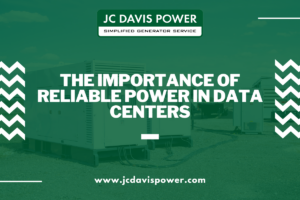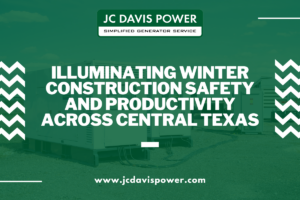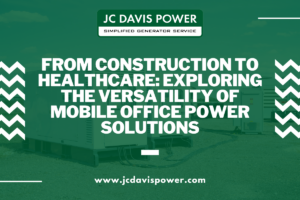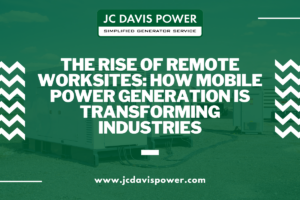Key Takeaways
- Unreliable power can lead to significant project delays and equipment damage.
- Hidden costs include long-term productivity losses and reputation damage.
- The U.S. economy loses between $28 billion and $169 billion annually due to power outages.
- Implementing backup power solutions and smart management technologies can mitigate risks.
- Proactive planning and investment in reliable power are crucial for project success.
Introduction: The Power Predicament in Construction
In the construction world, time is money, and power is the lifeblood of productivity. Yet, many project managers and construction company owners underestimate the profound impact that unreliable power can have on their operations. From the obvious setbacks of equipment failures to the less visible costs of decreased worker morale, power issues can silently erode your project’s profitability and timeline.
As we delve into the hidden costs of unreliable power on construction sites, we’ll uncover the true extent of this challenge and provide you with practical strategies to safeguard your projects against these often-overlooked risks.
Understanding the Scope of Power Reliability Issues
The U.S. Grid’s Vulnerability
The American power grid is facing unprecedented challenges. Aging infrastructure, coupled with increasing demand, has left many regions vulnerable to outages and inconsistent power supply. For construction sites, which often operate at the fringes of established power networks, this vulnerability is amplified.
Weather-Related Challenges
Extreme weather events are becoming more frequent and severe, posing a significant threat to power reliability. Storms, heat waves, and cold snaps can all lead to outages that bring construction to a grinding halt. In fact, weather-related outages have doubled since 2003, presenting a growing risk to construction timelines and budgets.
Regulatory and Infrastructure Hurdles
Changing regulations and the premature retirement of generating units are putting additional strain on the power grid. For construction projects, this can mean unexpected power shortages or quality issues that impact sensitive equipment and overall site operations.
The Visible Costs of Power Failures on Construction Sites
Immediate Project Delays
When the power goes out, work stops. It’s that simple. Every minute of downtime translates to:
- Idle workers
- Missed milestones
- Potential contractual penalties
These delays can quickly cascade, affecting not just the current task but the entire project timeline.
Equipment Damage and Replacement Expenses
Sensitive construction equipment can be damaged by sudden power losses or surges. From computers and surveying tools to more substantial machinery, the cost of repairing or replacing damaged equipment can be substantial. Moreover, the downtime associated with equipment failure compounds the financial impact.
Safety Risks and Potential Accidents
Unreliable power doesn’t just affect productivity; it can create dangerous situations on a construction site. Sudden blackouts can lead to:
- Tripping hazards
- Malfunctioning safety equipment
- Increased risk of accidents during critical operations
The costs associated with workplace accidents, both in human and financial terms, can be devastating for a construction project.
Unveiling the Hidden Costs
Long-Term Productivity Losses
Beyond the immediate impact, unreliable power can lead to a persistent decrease in productivity. Workers may become hesitant to start tasks for fear of interruption, leading to a culture of uncertainty and inefficiency.
Reputation Damage and Lost Opportunities
Consistently missing deadlines or delivering projects late due to power issues can severely damage a construction company’s reputation. This can result in:
- Lost future contracts
- Difficulty in securing favorable terms with suppliers
- Challenges in attracting top talent
Increased Insurance Premiums
Frequent claims related to power outages and associated damages can lead to higher insurance premiums. This ongoing cost can eat into profit margins long after the initial incidents.
Staff Morale and Retention Issues
Constant power disruptions can frustrate workers, leading to:
- Decreased job satisfaction
- Higher turnover rates
- Difficulty in attracting skilled labor
The costs of recruiting and training new staff can significantly impact a project’s bottom line.
The Ripple Effect: Beyond the Construction Site
Supply Chain Disruptions
Power issues don’t just affect the construction site; they can disrupt the entire supply chain. Delayed deliveries, spoiled materials, and communication breakdowns can all stem from power reliability issues, creating a domino effect of setbacks.
Client Relationships and Contract Penalties
Clients expect projects to be completed on time and within budget. Power-related delays can strain these relationships, potentially leading to:
- Contract penalties
- Loss of repeat business
- Negative word-of-mouth in the industry
Environmental Impact of Inefficient Power Use
Unreliable grid power often leads to increased use of diesel generators, which:
- Increase carbon emissions
- Contribute to noise pollution
- May violate local environmental regulations
This can result in fines and damage to a company’s green credentials.
Quantifying the Impact: A Look at the Numbers
Extrapolating National Statistics to Construction
While specific data for construction sites is limited, we can extrapolate from broader economic impacts. The Department of Energy estimates that power outages cost the U.S. economy between $28 billion and $169 billion annually. Given the power-intensive nature of construction, it’s reasonable to assume that the industry bears a significant portion of this cost.
Case Studies: Real-World Examples of Power-Related Losses
Consider the following hypothetical yet realistic scenarios:
- A mid-sized commercial construction project loses 2 working days due to power outages, resulting in $50,000 in direct costs and penalties.
- A large infrastructure project experiences equipment damage from power surges, leading to $100,000 in repairs and a week of delays.
These examples illustrate how quickly power issues can escalate into substantial financial losses.
Strategies to Mitigate Power Reliability Risks
Investing in Backup Power Solutions
Reliable backup generators are essential for any construction site. Modern systems offer:
- Quick switchover times
- Fuel efficiency
- Remote monitoring capabilities
While the initial investment may seem high, the peace of mind and protection against costly downtime make it a wise decision.
Embracing Hybrid and Renewable Energy Systems
Hybrid power systems that combine traditional generators with battery storage and renewable sources like solar can provide:
- Increased reliability
- Lower operating costs
- Reduced environmental impact
These systems are particularly valuable for long-term projects or remote sites.
Implementing Smart Power Management Technologies
Smart power management systems can:
- Optimize power usage
- Predict potential issues before they occur
- Automatically switch to backup sources when needed
This proactive approach can significantly reduce the risk of unexpected outages.
Developing Comprehensive Contingency Plans
Every construction site should have a detailed plan for power-related emergencies. This should include:
- Clear procedures for safe shutdown of equipment
- Communication protocols
- Strategies for minimizing downtime
Regular drills can ensure that all staff are prepared to act quickly when power issues arise.
The Role of Project Planning in Power Risk Management
Integrating Power Considerations into Project Timelines
From the outset, project planners should:
- Assess local power infrastructure
- Identify potential vulnerabilities
- Build in buffer time for possible power-related delays
This foresight can prevent many issues before they occur.
Budgeting for Power Reliability Measures
Allocate funds specifically for:
- Backup power systems
- Surge protection equipment
- Staff training on power management
Consider these as essential investments rather than optional extras.
Training Staff on Power Management Protocols
Ensure that all site personnel understand:
- How to respond to power outages
- The proper use of backup systems
- Energy conservation practices
Well-trained staff can significantly mitigate the impact of power issues.
Future-Proofing Construction Sites Against Power Issues
Emerging Technologies in Construction Power Management
Stay informed about innovations such as:
- Advanced energy storage solutions
- Microgrid technologies
- AI-powered predictive maintenance systems
Early adoption of these technologies can give construction companies a competitive edge.
Collaborative Efforts with Utility Companies
Build relationships with local utility providers to:
- Gain early warnings of potential outages
- Coordinate planned maintenance to minimize disruption
- Explore options for dedicated power lines for major projects
Advocating for Infrastructure Improvements
Construction industry leaders should:
- Engage with policymakers on grid reliability issues
- Support initiatives for infrastructure modernization
- Collaborate on developing standards for construction site power needs
Conclusion: Powering Through the Challenges
The hidden costs of unreliable power on construction sites are substantial and far-reaching. From immediate project delays to long-term reputational damage, the impacts can be devastating if left unchecked. However, by understanding these risks and implementing proactive strategies, construction professionals can significantly mitigate these challenges.
Investing in reliable power solutions, embracing new technologies, and incorporating power considerations into every aspect of project planning are not just best practices – they’re essential steps for ensuring project success in an increasingly unpredictable power landscape.
As we move forward, the construction industry must lead the charge in demanding and implementing more reliable, efficient, and sustainable power solutions. By doing so, we not only protect our projects and profits but also contribute to a more resilient and sustainable infrastructure for the future.
Are you ready to take control of your construction site’s power reliability? The time to act is now. Evaluate your current power management strategies, invest in robust solutions, and stay ahead of the curve. Your projects, your team, and your bottom line will thank you.
Take Action: Secure Reliable Power for Your Construction Site
Don’t let unreliable power derail your projects. If you’re in Texas or the surrounding states and need dependable mobile power solutions for your construction site, JC Davis Power is here to help.
Here’s how JC Davis Power can safeguard your projects against power-related issues:
- Controlled Project Power Costs: Their on-time power and lighting services help you avoid costly delays and keep your project on budget.
- Stress-Free Process: Let JC Davis Power handle the entire mobile power generation process, from delivery and installation to fuel management and maintenance.
- Project Efficiency: With reliable managed mobile power solutions, you can focus on your construction tasks without worrying about power interruptions.
- Diverse Solutions: Whether you need mobile office power generators or lighting towers, they have options to suit various construction needs.
- Comprehensive Service: JC Davis Power ensures consistent power supply throughout your project duration from initial setup to ongoing monitoring and maintenance.
Ready to power-proof your construction site?
Contact JC Davis Power‘s specialists today to discuss your power needs and secure a reliable energy solution for your project. Don’t let power issues compromise your success – take the first step towards uninterrupted construction operations now.
By partnering with a trusted power solution provider, you can mitigate the hidden costs of unreliable power and keep your construction projects moving forward efficiently and profitably. Secure your power, secure your success – reach out to JC Davis Power today.





